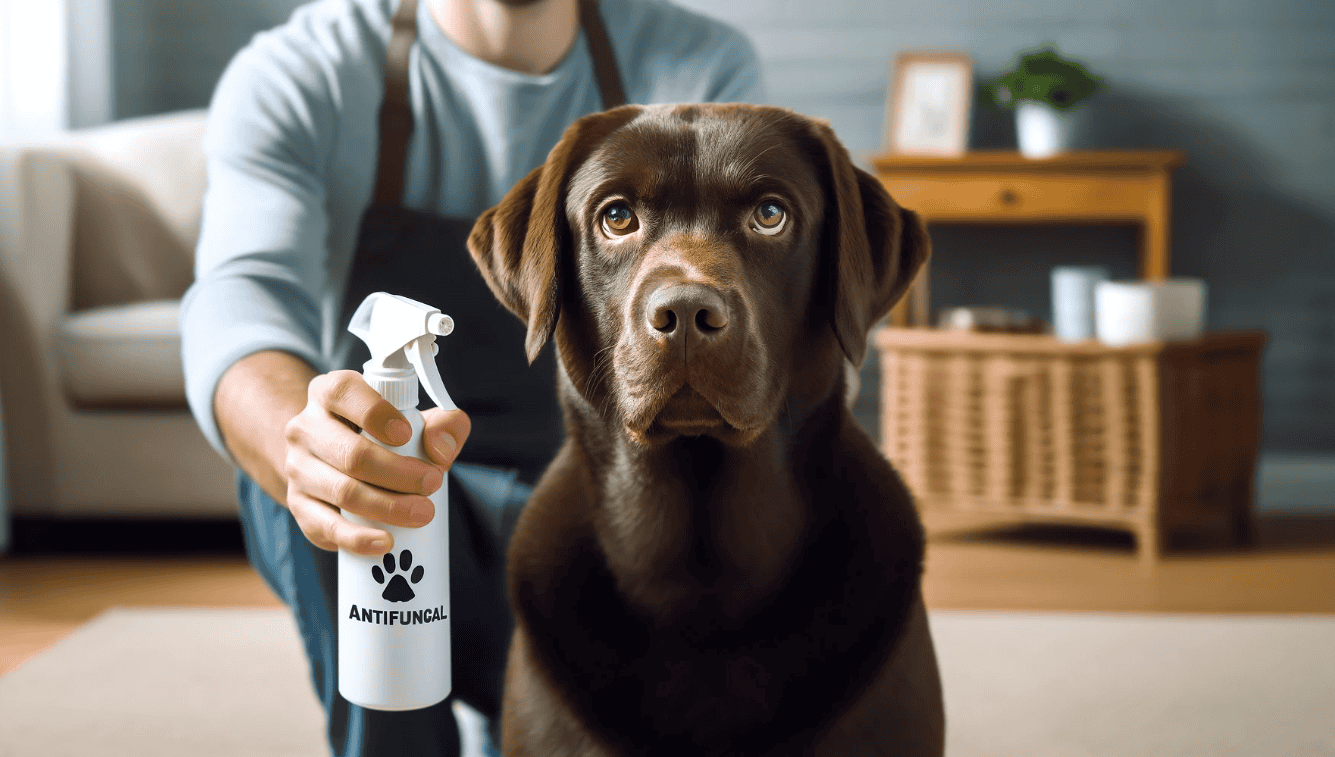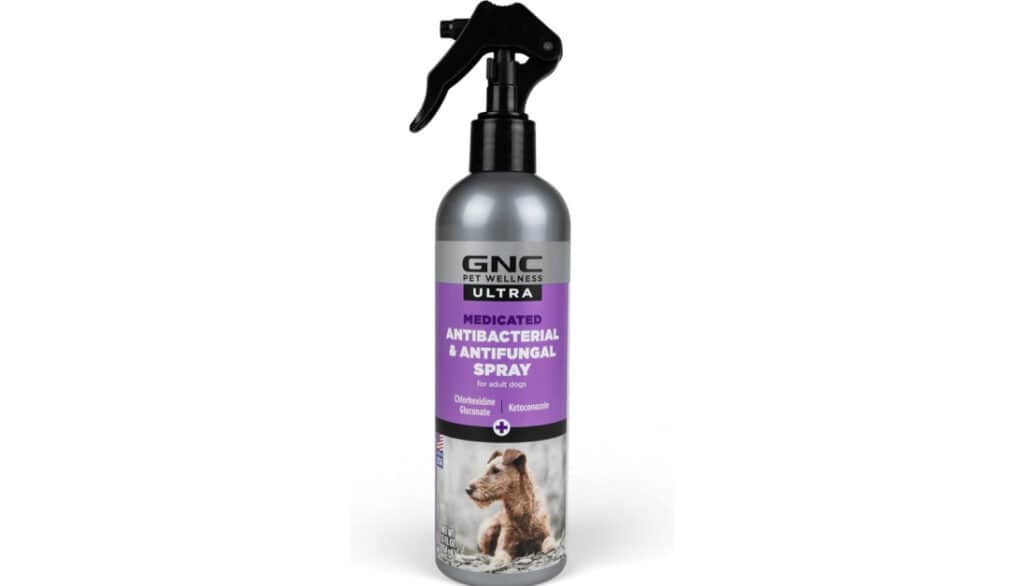Hello, I’m Dr. Candy Akers, a holistic veterinarian with years of experience in treating our beloved canine companions. Over the years, I’ve seen countless dogs suffer from the discomfort of fungal infections. These infections, while common, can cause significant distress if not addressed promptly and effectively. As a veterinarian, my mission has always been to ensure the well-being of pets, and that includes providing them with fast and effective relief from ailments.
Today, I’d like to introduce you to the world of antifungal sprays for dogs, a remarkable solution that offers rapid itch relief. In this blog, we’ll dive into understanding fungal infections in dogs, how antifungal sprays work, and I’ll also share my top recommendation for the best OTC antifungal spray. Let’s embark on this informative journey together, ensuring our furry friends remain happy and itch-free.

Fungal Infections in Dogs
Fungal infections in dogs are more common than many pet owners realize. These infections are caused by fungi, which are microscopic organisms that can thrive on the skin, in the nails, and sometimes even internally. While some fungi are harmless, others can lead to infections that cause a range of symptoms in our canine companions.
Types of Fungal Infections
- Dermatophytosis (Ringworm): Contrary to its name, ringworm is not a worm but a fungal infection. It manifests as circular, red, and scaly patches on the skin. It’s contagious and can spread between animals and even to humans.
- Yeast Infections: These are often caused by an overgrowth of the yeast Malassezia. Dogs with compromised immune systems, or those with skin that remains damp for extended periods, are more susceptible. Symptoms include itching, redness, and a distinct odor.
- Aspergillosis: This is a fungal infection that affects a dog’s nasal passage and sinuses. It’s caused by the Aspergillus fungus and can lead to nasal discharge and sneezing.
- Blastomycosis: This systemic fungal infection affects internal organs, skin, and eyes. It’s contracted by inhaling spores from the environment, especially in areas near water.
Symptoms to Look Out For
- Persistent itching and scratching
- Red, inflamed, or scaly skin
- Hair loss in patches
- Unpleasant skin odor
- Swelling or pain in specific areas
- Respiratory issues or coughing (for systemic infections)
- Changes in behavior due to discomfort
Why Treatment is Crucial
Fungal infections, if left untreated, can lead to more severe complications. Not only do they cause discomfort and pain to our pets, but they can also weaken their immune system, making them susceptible to other infections. Moreover, some fungal infections are zoonotic, meaning they can be transmitted to humans. Hence, timely and effective treatment is of the essence.
How Antifungal Sprays For Dogs Work
Antifungal sprays have become a staple in many pet owners’ medicine cabinets, and for good reason. These sprays are specifically formulated to combat the fungi responsible for causing infections in dogs. But how exactly do they work? Let’s delve into the science behind these sprays.
The Science Behind Antifungal Sprays
- Targeting the Fungi: The primary ingredients in antifungal sprays are agents that either inhibit the growth of fungi or kill them outright. These agents disrupt the cell walls of the fungi, making it difficult for them to thrive and reproduce.
- Providing a Protective Barrier: Many sprays also create a protective layer on the skin, preventing further fungal growth and shielding the skin from environmental factors that might exacerbate the infection.
- Soothing Ingredients: In addition to antifungal agents, many sprays contain ingredients like aloe vera, oatmeal, or chamomile. These ingredients help soothe inflamed skin, reduce itching, and promote healing.
Benefits of Using Antifungal Sprays
- Rapid Relief: One of the most significant advantages of using sprays is the immediate relief they offer. The moment the spray is applied, it starts working to alleviate symptoms like itching and redness.
- Ease of Application: Sprays are straightforward to apply, especially on dogs that might be resistant to oral medications or creams. A quick spray on the affected area, and you’re done!
- Prevention: Regular use, especially after activities like swimming or playing in damp areas, can help prevent the onset of fungal infections in the first place.
- Minimal Side Effects: Most over-the-counter antifungal sprays are formulated to be gentle on a dog’s skin, ensuring minimal side effects when used as directed.
Antifungal sprays are a potent weapon in our arsenal against fungal infections in dogs. Their ease of use, combined with their effectiveness, makes them an excellent choice for pet owners looking for fast and reliable relief for their furry friends. In the upcoming section, I’ll share my top recommendations for antifungal sprays, ensuring you make an informed decision for your pet’s well-being.

Best Antifungal Dog Spray – Dr. Candy’s Recommendation
Over the years, I’ve had the opportunity to evaluate numerous antifungal sprays available in the market. While many of them offer relief, some stand out due to their effectiveness, natural ingredients, and the rapid relief they provide. Here’s my top recommendation:
GNC Ultra Medicated Antifungal Spray 12oz
The GNC Ultra Medicated Antifungal Spray is a premium product that has consistently shown remarkable results in treating fungal infections in dogs. Its unique formulation not only combats fungi but also soothes the skin, providing immediate relief.
Key Ingredients:
- Antifungal Agents: These are the primary components that target and eliminate fungi, ensuring a rapid reduction in infection.
- Aloe Vera: Known for its soothing properties, aloe vera helps in reducing inflammation and promoting skin healing.
- Tea Tree Oil: A natural antiseptic, tea tree oil aids in combating various skin infections and provides a pleasant scent.
Benefits:
- Fast-Acting: Many pet owners have reported seeing a noticeable difference in their dog’s condition within a few days of application.
- Easy to Apply: The spray nozzle ensures an even distribution over the affected area, making the application process smooth.
- Holistic Approach: The combination of antifungal agents with natural soothing ingredients ensures that the spray not only treats the infection but also promotes overall skin health.
Usage Instructions: It’s essential to shake the bottle well before use. Hold the spray a few inches away from the affected area and apply generously. Allow it to dry naturally. For best results, use as directed or consult with your veterinarian.
Precautions: While the GNC Ultra Medicated Antifungal Spray is formulated to be gentle, it’s always a good practice to monitor your dog for any adverse reactions, especially after the first application. If you notice any unusual symptoms, discontinue use and consult with a veterinarian.
Choosing the right antifungal spray can make a world of difference in your dog’s comfort and well-being. The GNC Ultra Medicated Antifungal Spray, with its holistic approach and proven effectiveness, is my top recommendation. However, always remember that while over-the-counter solutions are beneficial, severe or persistent infections should be addressed with the guidance of a veterinarian.

How To Use Antifungal Spray For Dogs
Using an antifungal spray effectively is crucial to ensure that your dog gets the maximum benefit and relief from its symptoms. Here’s a step-by-step guide to help you apply the spray correctly:
Preparation:
- Clean the Affected Area: Before applying the spray, ensure that the affected area is clean. You can use a mild dog shampoo or simply wipe the area with a damp cloth to remove any dirt or debris.
- Dry the Skin: It’s essential that the skin is dry before application. Pat the area gently with a towel or allow it to air dry.
Application:
- Shake the Bottle: Before each use, shake the antifungal spray bottle well to ensure the ingredients are mixed properly.
- Hold and Spray: Hold the bottle a few inches away from the affected area. This ensures an even distribution of the spray. Press the nozzle and apply a generous amount to the infected skin.
- Let it Dry: Allow the spray to dry naturally on the skin. Avoid rubbing or wiping it off. This gives the active ingredients time to work on the fungal infection.
Post-Application:
- Monitor Your Dog: After applying the spray, keep an eye on your dog to ensure they don’t lick or scratch the treated area. If possible, distract them with a toy or treat for a few minutes.
- Check for Reactions: While most antifungal sprays are formulated to be gentle, it’s always a good idea to monitor your dog for any adverse reactions, such as increased redness, swelling, or any signs of discomfort. If you notice any unusual symptoms, discontinue use and consult with a veterinarian.
Frequency of Use:
- Follow Product Instructions: Always adhere to the recommended usage instructions on the product label. Some sprays may require daily application, while others might be used less frequently.
- Consult with a Veterinarian: If you’re unsure about the frequency of application or if the infection persists, it’s best to seek advice from a veterinarian.
Using an antifungal spray can provide rapid relief to dogs suffering from fungal infections. However, the key to its effectiveness lies in its correct application. By following the steps outlined above, you can ensure that your furry friend gets the maximum benefit from the treatment. Remember, while over-the-counter sprays are beneficial, always consult with a veterinarian for persistent or severe infections.

Conclusion
In the vast realm of canine health, fungal infections, though common, are often overlooked or misunderstood. As pet owners and caregivers, our primary goal is to ensure the comfort and well-being of our furry companions. Antifungal sprays have emerged as a beacon of hope, offering rapid and effective relief from the discomforting symptoms of these infections.
The journey we’ve embarked on in this blog, from understanding the intricacies of fungal infections to exploring the science behind antifungal sprays and their application, underscores the importance of informed and proactive care. My top recommendation, the GNC Ultra Medicated Antifungal Spray, is a testament to the advancements in holistic pet care, blending efficacy with gentleness.
However, as always, while products and remedies play their part, the true essence of pet care lies in our attentiveness, love, and the bond we share with our pets. Always be observant, seek guidance when in doubt, and remember that the best care is a blend of knowledge, timely action, and boundless affection.
To all the pet parents reading this, thank you for your unwavering commitment to your pets’ health. Here’s to many more itch-free, joyful days with our beloved canine companions!
Frequently Asked Questions
There are several antifungal sprays available for dogs in the market. One of my top recommendations is the GNC Ultra Medicated Antifungal Spray. It’s formulated to combat fungal infections effectively while also soothing the skin.
Yes, antifungal sprays are beneficial for dogs suffering from fungal infections. They provide rapid relief from symptoms like itching and redness. However, it’s essential to choose a spray that’s formulated for dogs and to follow the recommended usage instructions.
The frequency of application depends on the specific product and the severity of the infection. Many sprays recommend daily application, especially in the initial stages of treatment. Always adhere to the product’s label instructions and consult with a veterinarian if in doubt.
Yes, antifungal sprays can be effective in treating ringworm (dermatophytosis) in dogs. Ringworm is a fungal infection, and antifungal sprays target and eliminate the fungi responsible. However, for severe or widespread cases, additional treatments or oral medications might be required. It’s always best to consult with a veterinarian for a comprehensive treatment plan.
Antifungal dog sprays are available at most pet supply stores, veterinary clinics, and online retailers. When purchasing, ensure you choose a reputable brand and check for product reviews to make an informed decision.
